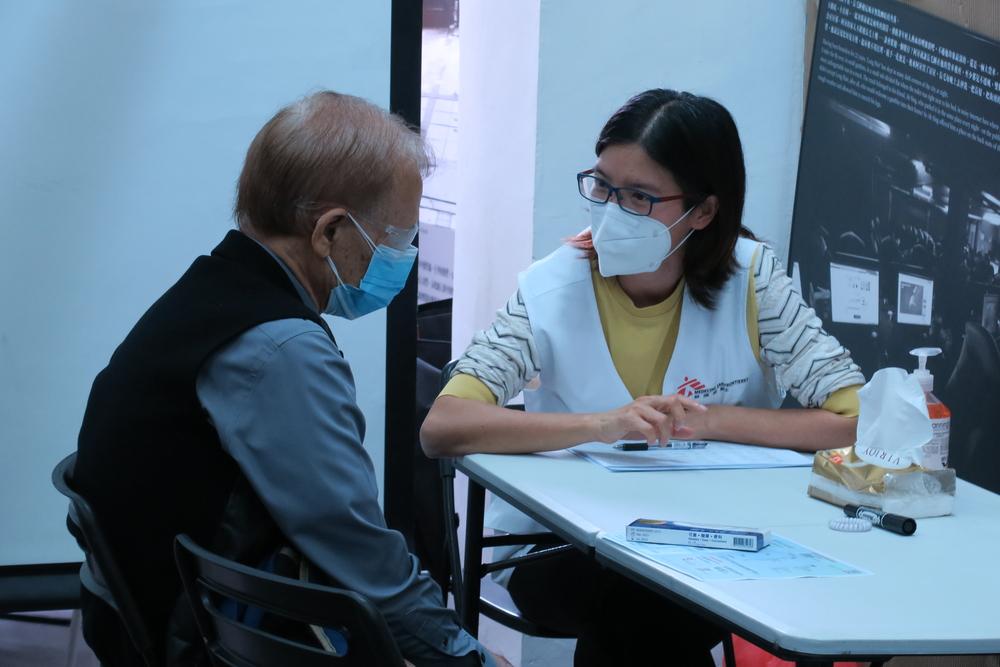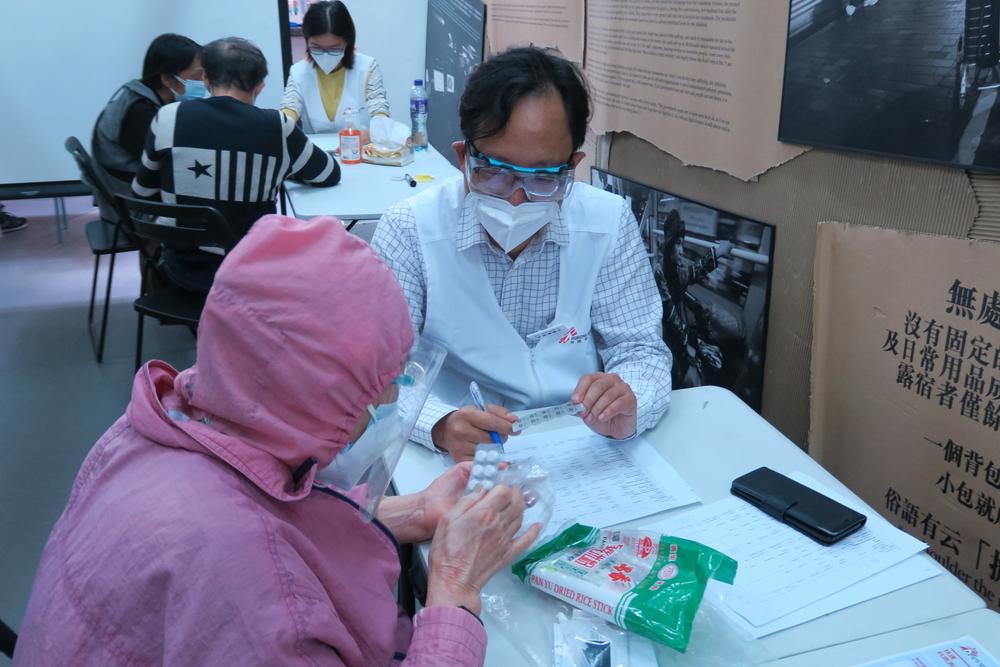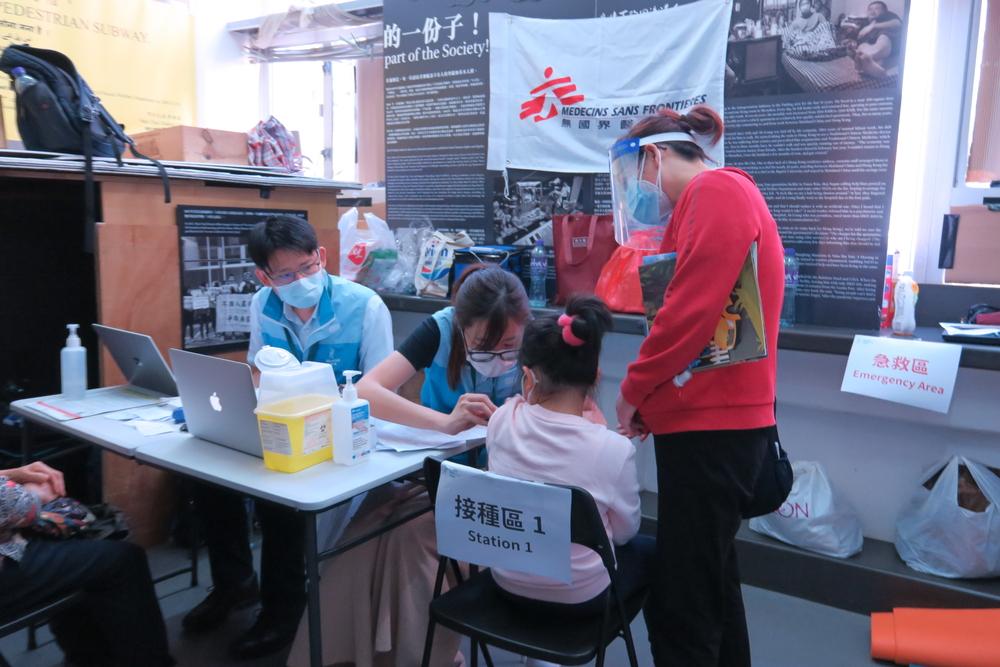Hong Kong: Doctors Without Borders collaborates with local NGOs to support vulnerable groups during the Omicron wave

Dr Joyce Ching, Doctors Without Borders medical doctor, spent more than half an hour listening closely to a patient's worries and analysing his medical condition during a consultation at the Doctors Without Borders mobile vaccination clinic. Hong Kong, 2022. © MSF
To address the needs and concerns of the community's most vulnerable groups, such as the elderly, low-income groups, the homeless and foreign domestic workers, the team deploys a multi-pronged strategy that includes reaching out to key authorities, collaborating with non-government organisations (NGOs) on people-centred vaccination programme and telehealth support, and conducting health promotion activities. Another feature of the project is delivering useful medical information and mental health tips to the Hong Kong public.
According to the official figures as of 10 March 2022, a total of 3150 deaths related to COVID-19 were recorded, the majority among the elderly and unvaccinated people. Thousands of people have been infected daily since February when the virus found its way to the densely populated community. As the COVID-19 control measures are changing rapidly, the anxiety and stress of every Hong Konger is heightened and compounded by the overwhelming amount of information being shared.

A senior citizen who lives alone in Sham Shui Po came to consult Dr Wilson Li, Doctors Without Borders Surgeon, in full protective gear. Hong Kong, 2022. © MSF
Considering the rapidly evolving situation and challenges, the Doctors Without Borders team has implemented its activities with a three-tiered approach:
Collaborations with local NGOs to deliver a people-centred care
Vaccination remains the most pressing and urgent need that requires a concerted effort to reduce the severity of the infection, and deaths, amongst elderly groups. The vaccine uptake rate amongst people aged 60 and above, many of whom have chronic illnesses, was relatively low due to fear of adverse effects and health concerns.
Doctors Without Borders is collaborating with the Society for Community Organisation (SoCO), an NGO with decades of experience working with low-income families and the elderly, to offer a people-centred vaccination programme to these vulnerable groups at high risk of severe COVID-19 infection. The programme consists of two sessions: medical consultations and inoculation.
Doctors Without Borders doctors provide free medical consultations for persons who have worries and questions about vaccination and the current pandemic. Should they wish to proceed to be vaccinated, an on-site mobile clinic is arranged for inoculation. We also have a team to help patients especially the elderly, with things – such as digital registration, uploading vaccine certificates online, in addition to health promotion and education and well-being talks. The first round of mobile vaccination programme has served 27 people and new schedules are being arranged.
What we are doing here is beyond a simple vaccination programme. We are doing this with a person-centred-care approach, namely looking into the clinical, psychosocial and cultural aspects of our patients. Helping them to fill the forms and upload the vaccination certificate, teaching them how to use the rapid antigen test, and listening to their concerns, we believe these are appreciated by the elderly as well. The pandemic is affecting us both physically and mentally, showing our care, concern and support to one another is equally important.Dr Nason Tan, Ops Support Unit Director
At the same time, Doctors Without Borders is providing telemedicine support to foreign domestic workers who have difficulties in getting useful and reliable health information and services due to language barriers. Doctors Without Borders has tapped into the network of organisations who are helping these groups. The first recipient of this service is HELP for Domestic Workers, with appointments held every Wednesday and Saturday night.
Health promotion to clarify misinformation and mental health tips for well-being
In a fast-changing situation, we are dealing with a lot of anxiety and stress while taking care of family members and ourselves, as well as feeling overwhelmed by the overload of information. Our team has conducted webinars in different languages to share COVID-19-related medical facts and mental health coping tips and clear up some of the most prevalent misinformation. Children’s storybooks were created and disseminated to more than 60 organisations to aid parents and kids dealing with anxieties. Our ‘How Are You’ mental health website is designed by Doctors Without Borders psychologists as repository of coping tips to guide every Hong Konger on how to take care of your well-being.

Doctors Without Borders collaborates with Society for Community Organisation (SoCO) and Shoebill Health Care to provide the mobile vaccination programme for the elderly and low-income families in Sham Shui Po. Hong Kong, 2022. © MSF
Engaging with relevant HK authorities and medical associations
We have been talking to the HK authorities responsible for the outbreak response. Our rounds of meetings have focused on the issue of lowering the morbidity and mortality rate of Omicron amidst the shortage of manpower. The majority of Doctors Without Borders Hong Kong medical workers are currently working in the public healthcare system and on the frontline since the beginning of the surge.
To relieve the burden on our fellows in the medical community and the overwhelming demands at hospitals, we have told the authorities that we are ready to deploy our international medical teams with vast experiences in fighting outbreaks. They are on standby and ready to be mobilised should the authorities permit, with visa, travel and other administrative hurdles cleared. In the meantime, we constantly engage with them about the current activities we are able to do for the high-risk groups in the community.
Doctors Without Borders responded in Hong Kong when the COVID-19 first broke out in 2020. Doctors Without Borders addressed the needs of vulnerable populations by conducting health promotions and stress and anxiety workshops, as well as collaborating with a local organisation to provide temporary shelter and medical consultations for the homeless. After the closure of the project, the Doctors Without Borders Hong Kong team has continued to explore ways to assist the broader spectrum of people living at the periphery of the society through the network of local organisations.